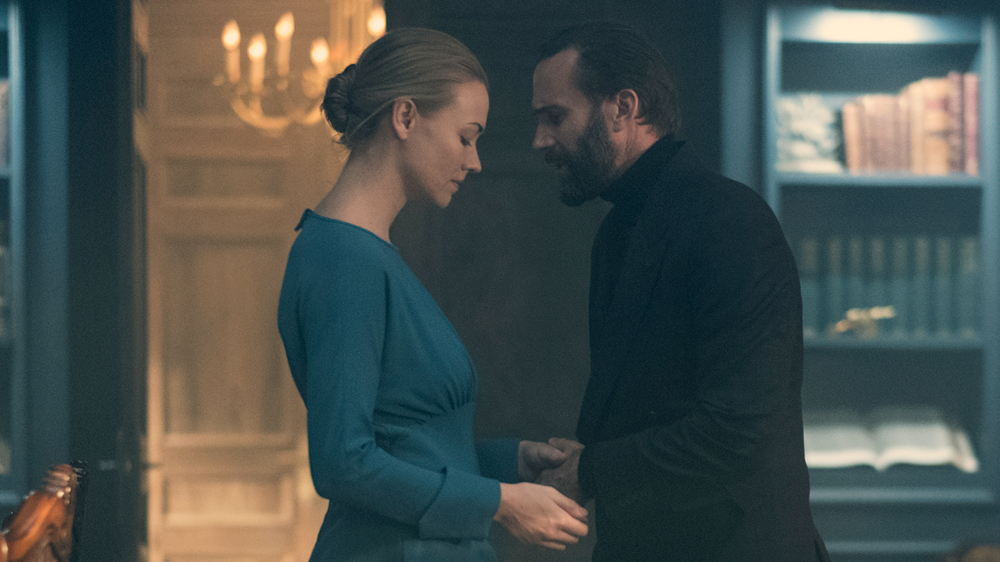‘The Handmaid’s Tale’ Boss on Fred’s New Position: ‘It’s Like Being No. 2 in Al-Qaeda’
By Danielle Turchiano
LOS ANGELES (Variety.com) – SPOILER ALERT:
Do not read if you have not yet watched “Women’s Work,” the eighth episode of the second season of “The Handmaid’s Tale.”
While the Gilead bombing was catastrophic, it was not fatal for Fred Waterford (Joseph Fiennes). The commander managed to survive the blast — albeit not unscathed — and now he has a road of recovery ahead of him. But his work isn’t just going to be about getting back to physical shape, it’s also mental — and restoring the power dynamics of his household.
“There’s a certain element of post-traumatic stress for a long time up,” Fiennes tells Variety. “I think he views anyone in a red cape as a kind of terrorist. If anyone walks in, there’s kind of a big jolt. I think it’s really affected him and he can’t even manage.”
As someone who led the charge for Americans to change their ways when infertility was first becoming a notable epidemic, Fred helped bring about the Gilead order. But now, in some ways he is just as powerless as the women he has been holding down — and he realizes it.
“There is a vulnerability with people right within your own household — the people you thought you had control of actually fight back,” Fiennes says. “And I don’t think he blames Offred, but I certainly think there are questions to her loyalty and people like her, and that throws him off big time.”
Showrunner Bruce Miller adds that since so many other commanders are dead, Fred is finally able to move up in the ranks — which is ultimately what he has always wanted — but there is much more at stake now.
“All of those people are dead — someone killed them all — so you’re next. You’re basically moving up on the target — it’s like being No. 2 in Al-Qaeda [and] how many No. 2s did they go through?” Miller says. “So it affects him, on every level, and it’s a little bit of ‘Life is short and I want what I want and why aren’t I getting it?’”
Revealing that Fred will continue to “lose his grip” and “become more violent” as the rest of the season unfolds, Miller says the commander’s biggest hurdles are his PTSD, anxiety, and invalidity. But what keeps him going, Fiennes says, is the baby on the way.
“I think what he really believes in is his status if he were to have a child,” Fiennes says. “If he were to have a boy, what that would mean? It would push him up the ladder. And also, in their society, what an achievement. It’s the sort of picture postcard image for Gilead — everything they’ve promoted. Now, is he harboring ill thoughts as to how this baby came about? Yes, I think he is, but I think what supersedes that is his sense of ambition and the picture it will paint for him and how it will further his position in society.”
Meanwhile, Yvonne Strahovski admits that “Serena is also power-hungry in her own way and uses power in her own way to abuse people like Offred,” too. But she feels that Serena’s actions of temporarily bringing in a woman to examine Janine’s (Madeline Brewer) sick baby, because she was previously the best in that field of medicine, were less about newfound power going to Serena’s head, and more about her maternal instincts to help that baby at any and all costs.
“Her own idea of motherhood [is] challenged,” Strahovski says of Serena’s continuing journey. “She is an expectant mother, even though she’s not carrying the child, and these are all of the things she’d be thinking about now.”
Fiennes believes Fred has always “loved strong women,” evidenced by how he supported his wife’s ambition before Gilead. But he first let her “fall by the wayside” in Gilead and now is threatened by her willingness to act without him, which is not in accordance with the Gilead law they are supposed to carry out. Fred has embraced the darker parts of the new society, including corporal punishment to put her back in her place after she stepped up as a leader in his absence.
“What’s been interesting about season 2 is seeing how does someone become a monster?” Fiennes says. “Fred, to me, is an ordinary man. And there must have been, in the Nazi party or any awful fascistic, patriarchal societies that have come before, people that have kind of gone with the party lines — that kind of [fell] into it, that weren’t ardent believers but convinced themselves in order to survive. They themselves are trapped. So I kind of feel that this is kind of an impossible ride he can’t get out of that he partly believes in but is partly cognizant of the corruptness. It’s a complex one for Fred — as he obtains power, the power corrodes his moral compass.”
And what Fred’s actions against his wife prove is that even Serena– who is “top of the food chain when it comes to women” in Gilead, Strahovski poiints out — “truly isn’t safe either.”
“You see this total isolation take over Serena. She’s truly, truly alone. She has a lot to be bitter about and miserable about,” Strahovski says.
New episodes of “The Handmaid’s Tale” stream Wednesdays on Hulu.

